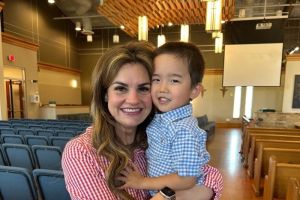The whole (student) Body of Christ: Why community colleges are a vital mission field

What happens when a campus ministry realizes it’s missing a quarter of its mission field?
Until a decade or so ago, campus ministries like InterVarsity (which I serve with) were slow to see the need for ministry to community college students and faculty. The dominant model of higher education was the four-year university. We built programs and poured resources into reaching every corner of that context: faculty, international students, graduate students of every stripe, just to name a few. We thought we were doing well.
But under our noses, the higher education ecosystem was changing. While we were trying to build the body of Christ at four-year schools, our ministry left a whole other part of the student body under-served: community colleges.
It was a significant oversight. And we needed to change.
By God’s grace, that repentance has produced a growing and vibrant outreach to community colleges in our movement over the last 20 years. Even more, it’s given us a deepened sense of why reaching these campuses is essential for strengthening the whole body of Christ.
First, community college students are uniquely positioned to impact their community for God’s kingdom. Most students at community colleges come from the local area and remain after graduation. They carry a special mix of relational ties, church connections, and neighborhood knowledge with them when they come to campus. Later on, they become the future school board members, local government leaders, retail managers, law enforcement, and more after they graduate. They stay in and shape their home communities in ways that students who go away to college can’t.
As disciples of Jesus, these students are an irreplaceable part of God’s work creating lasting shalom. Because of their strategic value, prioritizing a Gospel witness to them is an essential part of serving the whole body of Christ.
Second, these students are crucial for serving and reaching under-resourced communities, whether urban or rural. Roughly a third of all community college students are first-generation college attendees, and almost half are people of color. 55% of them come from families with yearly household incomes of $30,000 or less. Taken together, the data shows how this slice of the student body is overwhelmingly rooted in communities whose access to financial resources and systemic advantages has often been restricted. In a season where denominations and church planting networks are re-examining how to serve and reach rural and urban communities, community college ministry could represent a significant investment in the future leaders of those communities.
Lastly, community colleges help the church enlarge its vision for ministry. Too often, the church’s imagination for discipling emerging adults ends at youth group. These students do not automatically become mature adult believers upon entering college. In fact, they still need the church’s support as much as they did in high school, if not more so. Yet they often tumble into the gap between youth group and adult church life — between their unique discipleship needs and the ministry status-quo.
Local churches often share our old blind spot for campus ministry. When InterVarsity consults with churches that want to reach college campuses, few of them ever name a local community college that may serve many of their own children. Instead, they focus on prestigious four-year institutions that may be farther away from them geographically than a two-year school nearby.
But there’s something essential about proximity that we shouldn’t miss. Because community colleges represent communities, campus ministries reaching community colleges should represent the community as well. One fruitful solution to this problem that we’ve found is to embrace and pursue partnership.
Rather than individual churches attempting to reach local community colleges on their own, what if 10-15 local churches partnered together (potentially with a campus ministry like InterVarsity, Cru, or The Navigators) to develop a more sustainable, effective Gospel presence at a campus than what any single church could do alone — and, at the same time, more fully embody the community’s Christian witness as a whole. (The EveryCampus movement — itself the fruit of a partnership between InterVarsity, Cru, and many others — has a searchable database of every known campus without a Gospel witness.)
Partnerships like this have the uncommon potential for transforming both students and churches. Students who come to faith in these contexts have a variety of church options to explore and learn from. Even more, they would witness the Gospel’s astonishing power to create unity in the body of Christ — a critical testimony during this time of polarization and division. Churches would have their holy imaginations stretched in a fresh, soul-enlarging way. They would receive even more renewal as they open themselves to new types of ministry and be encouraged by the new transformation the Holy Spirit brings.
As we ask ourselves where God is on the move, we would be wise to turn our eyes to the thousands of community college campuses where a Christian witness does not yet exist. In them, we find microcosms of God’s kingdom — places where diversity and creativity are wed, filled with students uniquely fashioned for a role in God’s mission.
Greg Jao is Executive Vice President of Communications and Mobilization at InterVarsity Christian Fellowship/USA and is the author of several books, including Your Mind’s Mission, The Kingdom of God, and a contributing author to Following Jesus without Dishonoring Your Parents, Telling the Truth, and Voices of Conflict & Voices of Hope.



























